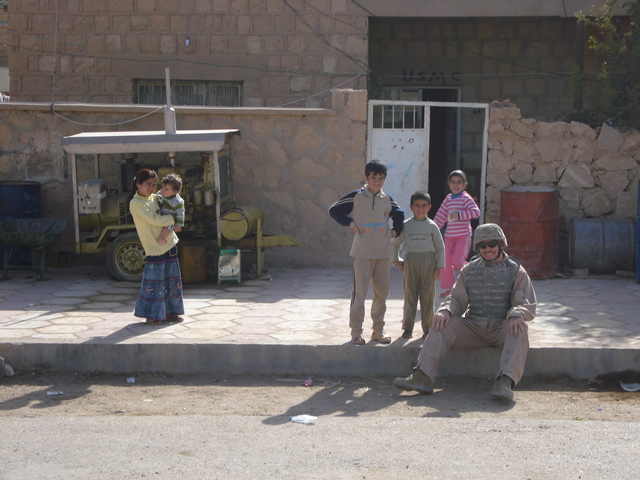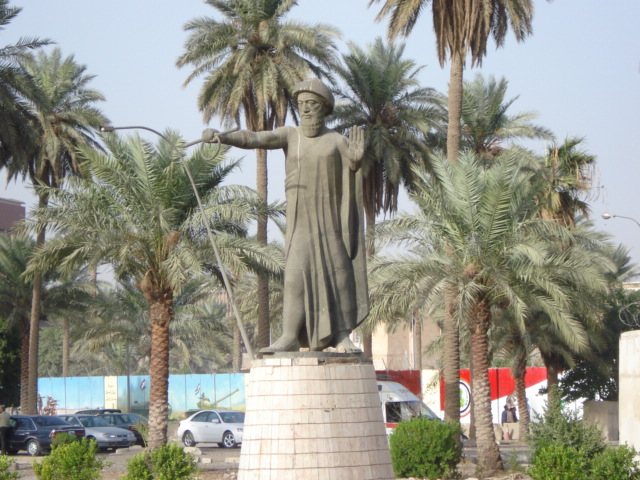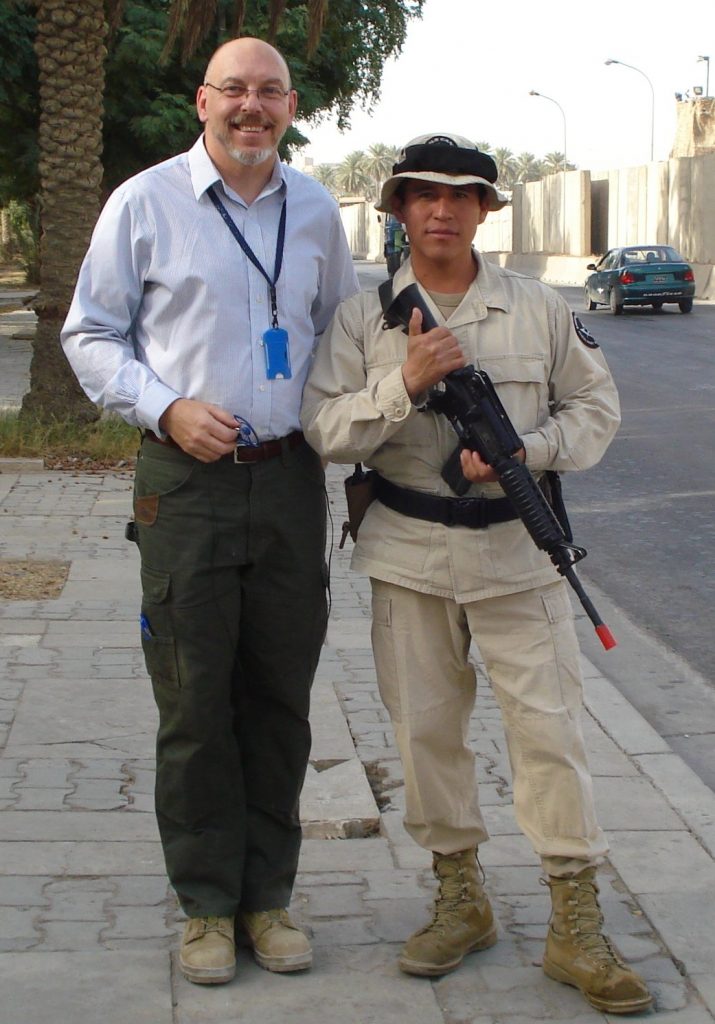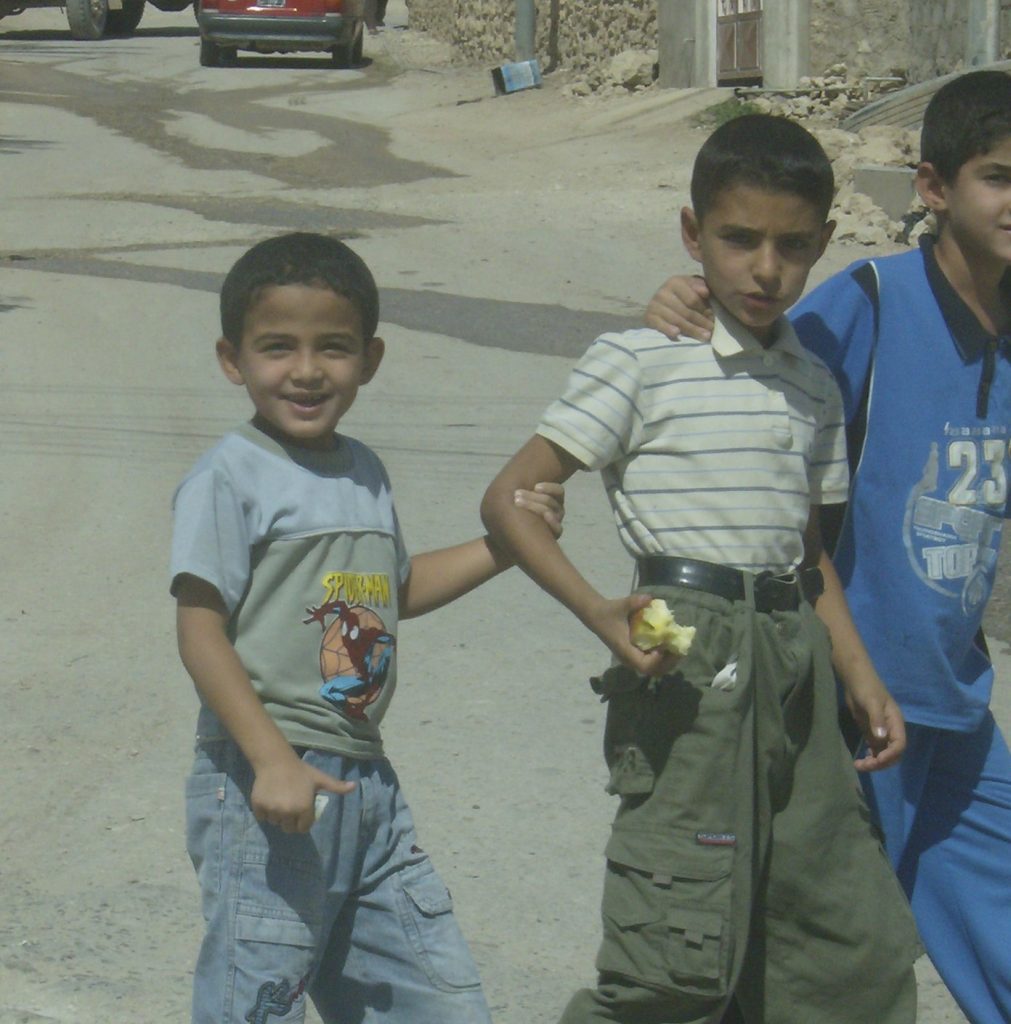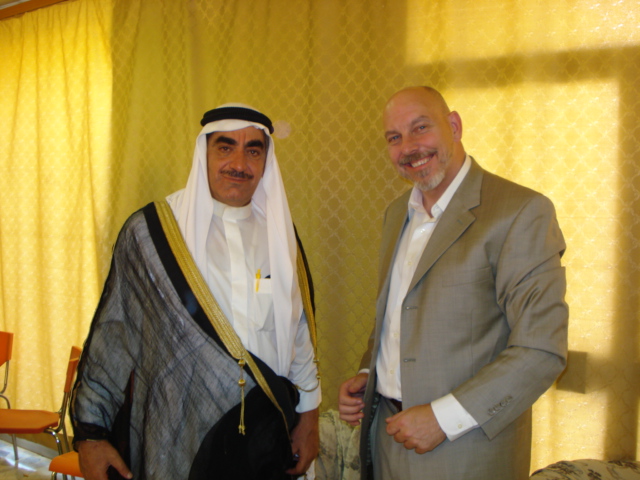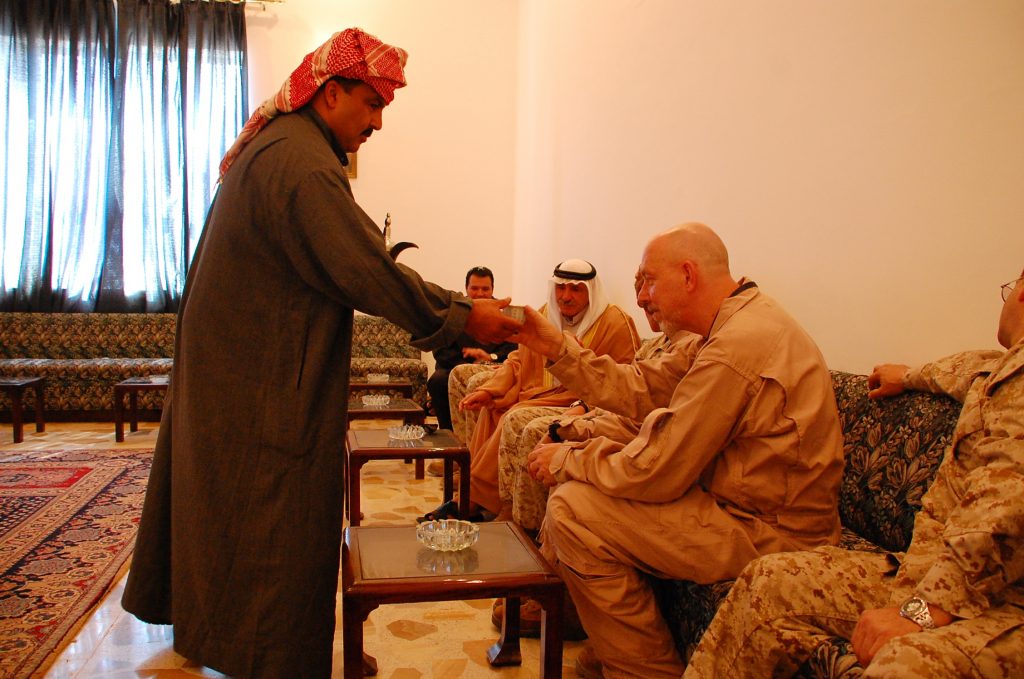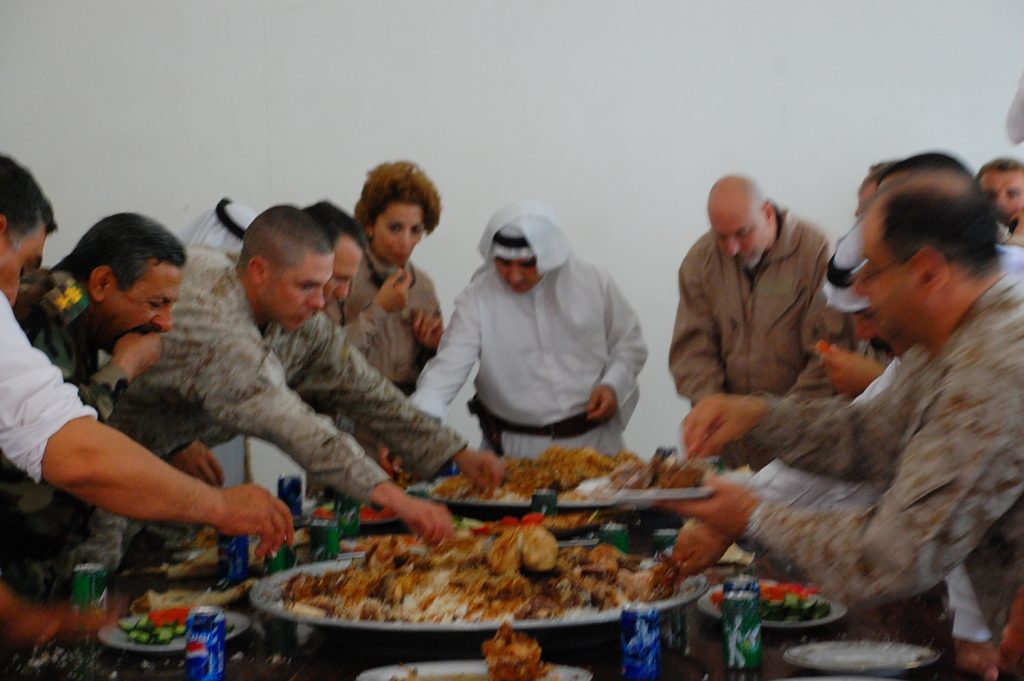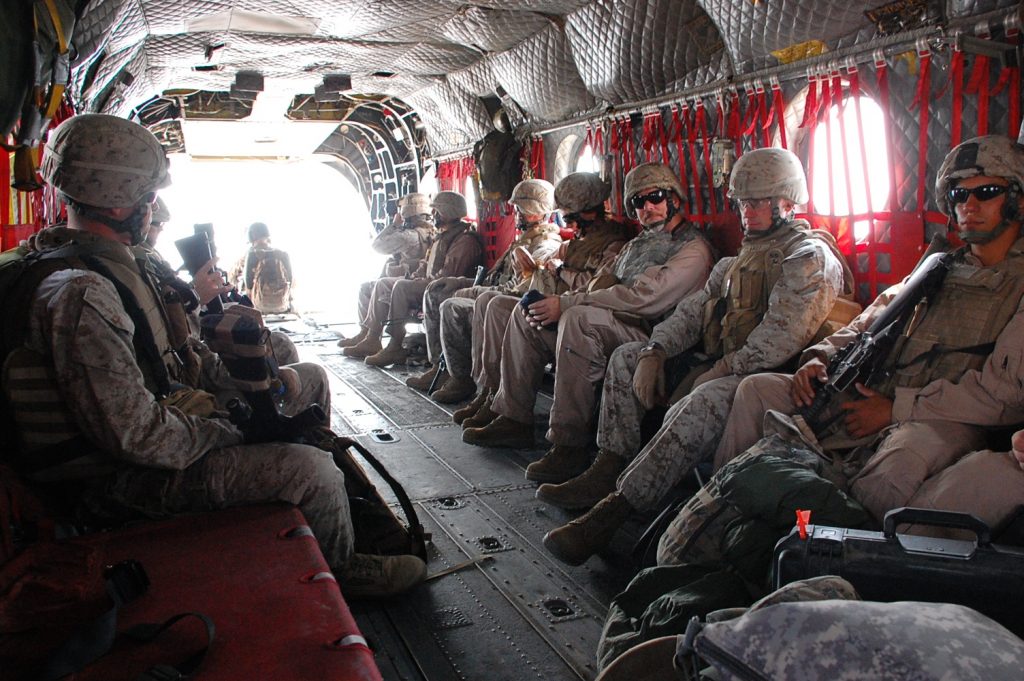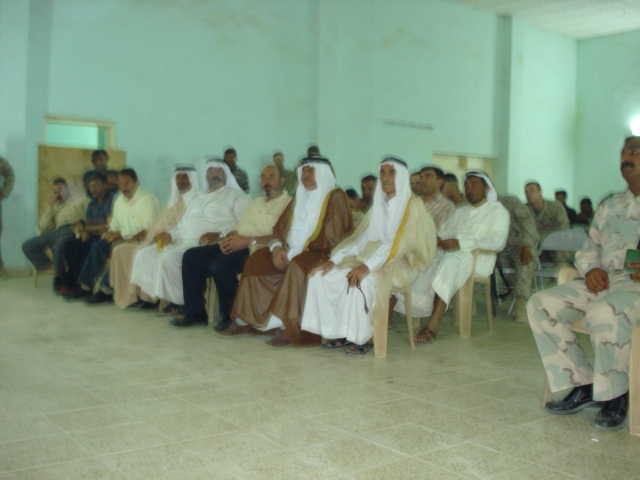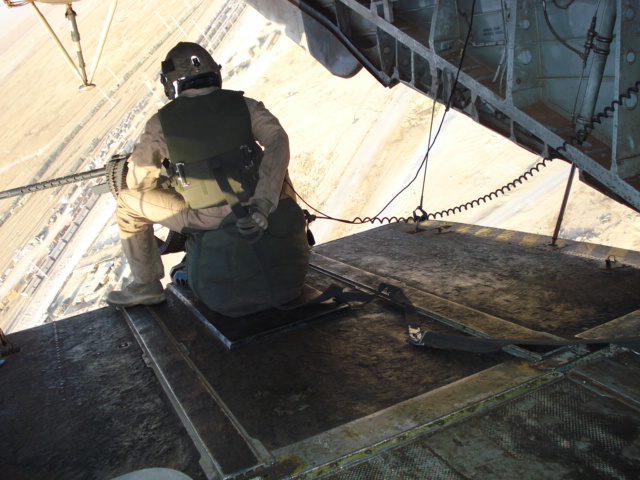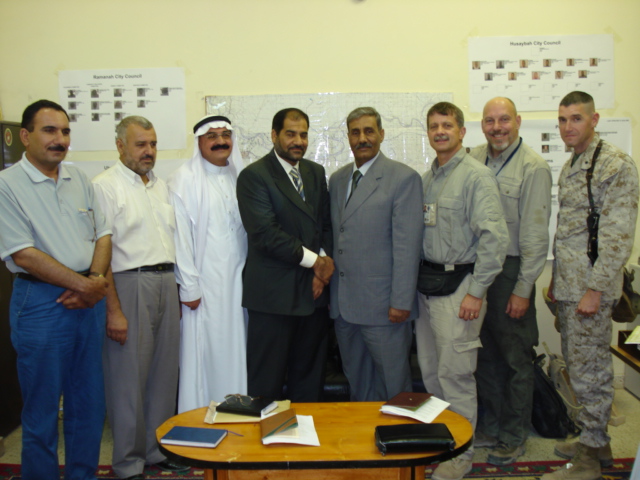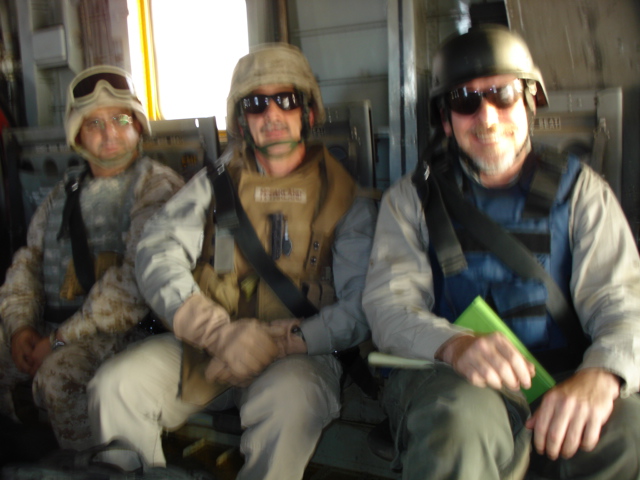These are some of the Iftar guests waiting to hear the after dinner talk. Sorry for the blur. I have to work on my camera settings.
It was a long helicopter ride to Haditha. We had the show time of 11. Then we had to wait in the sun for a long time. Then we had to land and refuel. Then we flew I do not know where. The bottom line is that the half hour trip took about 3 hours.
We were going for an Iftar dinner, but since I had a few hours before the event, we went to the CMOC, the place where the Marines interface with the local people. Since it was Tuesday, they were open for business. Movement in the city is still controlled and the Marines issue driving permits. It is a very good way to get to know the people and get a handle on the population. Unfortunately, it is “good” in the way a visa line is good. People come, but waiting in line for hours is not their idea of a positive experience. How popular is the DMV back home? For now the process provides valuable security protection, but we need to get out of this business quick as we can. You do not win friends by creating backlogs.
There must have been a couple hundred Iraqi men waiting in line. Many were dressed in various traditional costumes. The balance had on something like polo shirts. They were very patient. To the apparent surprise of my translator, I decide to work the line. My translator assured me that no good could come from this, since they would not tell me the truth, but I figured I could learn something from what they said anyway. Most told me that the security situation had improved. About that they were happy. But the restrictions and bureaucratic procedures were starting to pinch. One guy claimed he delivered cooking gas and had to cross the bridge. He needed a permit and he complained that he had to renew that permit each week, standing hours in line each time. He had a point. Other people just did not like the procedure. Some figured that they were important people and should not have to put up with such trouble. I suppose they had a point too. One guy, who insisted on speaking English but was really hard to understand, told me he was a Turkoman who had fled the city of Kirkuk. He was not fond of the Kurds and evidently they felt the same way about him, hence his unexpected sojourn in Syria, where he was treated poorly too, and ultimate settlement in Anbar. He offered the unsolicited advice that I should never eat any food in the south of Iraq because it would give me diarrhea. Let’s hope he doesn’t end up there should he fall out with the Anbari.
Dressed as I was in my wrinkle free blue Brooks Brothers shirt and civilian clothes (I made a special point of being “civilian”), I am not sure the people in the line knew what to make of me. Of course I doubt anybody told me the whole truth, but their words had the feel of “truthyness”, as Stephen Colbert says. I do not know if the smiles were sincere, but the grumbling was real – and justified. I am sure they also felt a lot of anger, which they did not express to me. In their place, I sure would have felt that way.
After a while I realized that they thought I could solve some of their problems. I felt bad for creating the false hope so I retreated inside. I am a great believer in eliminating the petty annoyances that plague ordinary people’s lives and I am trying to think of suggestions to ameliorate the situation, but it really cannot be fixed. The Marines were working hard & treating the people with respect. The Iraqi police, who were doing the initial screening, seemed polite. When it is not Ramadan one of the Iraqi employees told me that they provide water, but there is only so much you can do with something like this. We need to eliminate the whole thing. The Catch 22 is that we cannot do that until the situation is more “normal” but such daily annoyances are among the things that make it abnormal.
Iftars start at sundown, so we started up to the police HQ around 5:30. This are used to be a youth center and sports complex. There was a soccer field with bleachers. It looked like an ordinary soccer field, except there was no grass. One of the guys explained to me that it would not be worth the water to grow grass and that Iraqis were accustomed to these kinds of surfaces anyway. I suppose it is like playing tennis on a clay court – a dusty clay court.
We went through Iraqi security and then Marine security and got to a big lecture hall where the Iftar meal was to be held. The local civil authorities and sheiks started to arrive. The most important was a very old and frail looking guy who chain smoked. He was very old, but despite the nasty habit was in good health. He still has a strong handshake and I could see and feel the politician in him even in the twilight years. He had decided that it was in the best interests of his people to go with America. He was right and we were grateful. I then met some of the younger guys. When they shake hands, they do a type of shoulder bump. I had seen it before and even practiced it, but they noticed my inexperience. One of them told me that I would get better as I spent more time in Iraq.
The mayor of Haditha was the official host. When I talked to him, it was clear he was interested in the good of his people. He said that schools were most urgent. They had school buildings, but were lacking desks, supplies and often windows. There is also a shortage of trained teachers. Iraqis had once been among the most educated people in the Arab world, but Saddam was not much interested in it, especially in the later years. The government would sometimes make a PR point of opening a new school, but they did maintain the ones they had. Education was a kind of Potemkin village in Iraq.
The mayor of neighboring Barwana said very similar things. He was a friendly younger guy. He said he could understand English, but not speak it. I am inclined to believe he was telling the truth. He seemed to know what I said before the translation came in.
Power for both cities comes from the Haditha Dam, which impounds the water of the Euphrates. The dam is running at capacity, but that capacity is low. This country has lots of potential. It has come a long way and there is a lot of work to do, but I think it can make it this time, God willing.
I spoke to the colonel of the Marines who is scheduled to take over command in Haditha. He had been in Falujah during the intense fighting there a couple years ago. He told me that the change in Al Anbar is unbelievable. When he was here last time, he thought that we had essentially lost and that all that was left was the recognition. Today things are going in our direction and peace is possible.
This was a good visit. People were friendly and seemed ready to cooperate. My only fear is that we ( and I) will not be able to live up to expectations. There is a lot to do here and it is hard to get things done. The flight back was uneventful. I still do not like helicopter rides at night, however.
